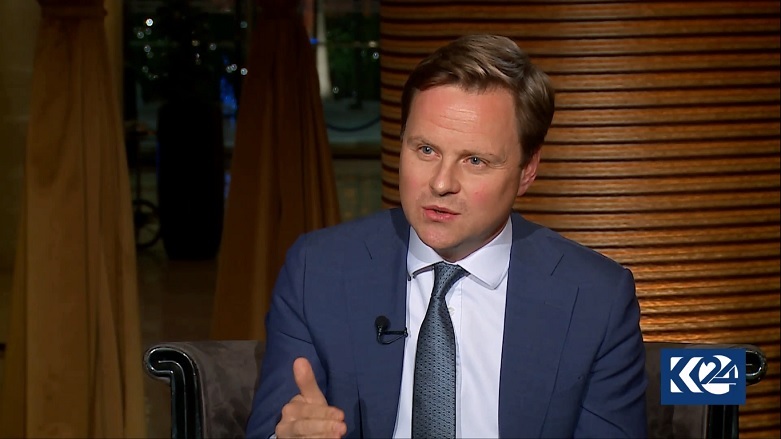British Ambassador to Iraq pushes for implementation of Sinjar Agreement, Article 140

ERBIL (Kurdistan 24) – The UK's top envoy in Iraq on Monday stressed the importance of implementing the Sinjar (Shingal) Agreement, reached by the federal government and the autonomous Kurdistan Region in October to facilitate the safe return of thousands of members of the Yezidi (Ezidi) religious minority, while also reaffirming his nation's ongoing support for Kurdish Peshmerga forces in the fight against the Islamic State.
“We continue to encourage both governments to work together in harmony to resolve these problems,” British Ambassador to Iraq Stephen Hickey said in an interview with Kurdistan 24.
Read More: KRG and Baghdad reach administrative, security agreement on Sinjar
Over five years have passed since November 2015, when Sinjar was freed from the Islamic State's reign of terror over the Yezidi-majority district.
Since late 2017, though, Iraqi forces, Iran-backed militias of the Popular Mobilization Forces (PMF), and the Kurdistan Workers' Party (PKK) have all maintained a significant presence in the disputed district.
The agreement involves understandings on security, civil administration, reconstruction, public services, and the return of internally displaced persons (IDPs).
Notably, it also includes plans to withdraw all armed groups from the area – namely the PMF and PKK – to restore the local administration, and appoint a new mayor.
Residents and other witnesses in multiple areas, however, say that members of both groups remain in Sinjar.
Ambassador Hickey stressed that it was crucial “for all sides to fulfill their responsibilities and withdraw from the town of Sinjar.”
He also stressed that “for the existence of proper security and proper services in Sinjar, the armed groups must withdraw for the Iraqi security forces to play their role in and around Sinjar, providing security.”
If not, he continued, “The main losers will be the inhabitants of Sinjar, including many thousands of Yezidis (Ezidis) who are still in displacement camps in the Kurdistan Region and elsewhere.”
The British diplomat also confirmed the UK’s continued support for Peshmerga forces through the US-led Coalition to Defeat the Islamic State, while at the same time expressing his country’s will to “reform and strengthen the Peshmerga, as well as to unify them, by working closely with the Ministry of Peshmerga and the reform director to make sure that happens.”
The British ambassador also affirmed the importance of international support to the Peshmerga and the Iraqi Armed Forces for them not to “allow for Daish (Islamic State) or other extremist groups to return.”
He also pushed for the implementation of Article 140, introduced into the Iraqi constitution to allow its 2005 ratification by kicking controversial decisions on disputed territories down the road, but well over a decade has passed since the 2007 deadline for it to be carried out.
“We believe that implementing Article 140 of the Iraqi constitution is extremely important. I think the best way to make progress on Article 140 and related issues is dialogue between Erbil and Baghdad.”
In another segment of the interview, Hickey expressed support for the Kurdistan Regional Government's (KRG) current efforts toward widespread reform.
“I have spoken personally with Prime Minister Masrour Barzani about this matter,” he explained, “and it's clear that he has a strong vision for political and economic reform in the Kurdistan Region, despite difficult economic circumstances across the whole of Iraq and the world due to COVID-19 and fallen oil prices.”
The ambassador also praised the KRG’s efforts to prioritize the growth of the Kurdistan Region's private sector, remarking that “depending so much on oil in the long-term won’t provide the jobs and the type of dynamic economy that the people want to build.”
In reference to recent missile strikes in the regional capital of Erbil, seen by most observers as having been launched by PMF-affiliated armed groups, “We believe that these rocket attacks are completely unacceptable and there has to be the full enforcement of the law and accountability for these crimes.”
Read More: Several rockets land outside Erbil International Airport in late night attack
“We strongly support the efforts of the government in Erbil and the government in Baghdad to find these criminals and to hold them accountable, as there could be no justification whatsoever for these attacks,” he concluded, adding that the UK will continue to play a supportive role in the security and stability of both Iraq and the Kurdistan Region.
Editing by John J. Catherine